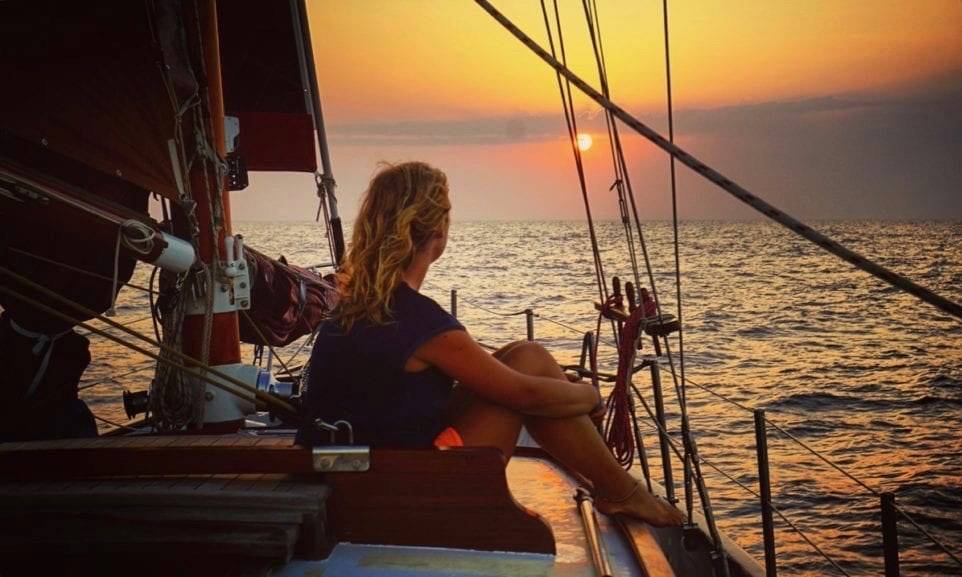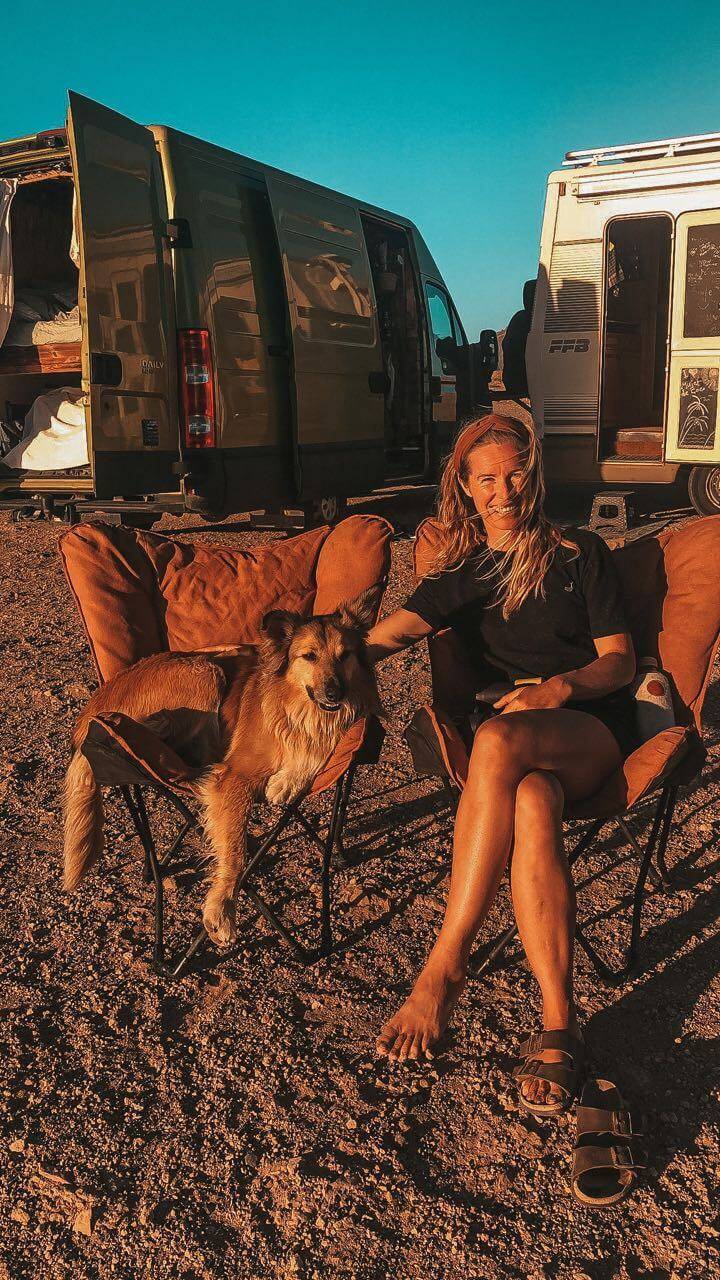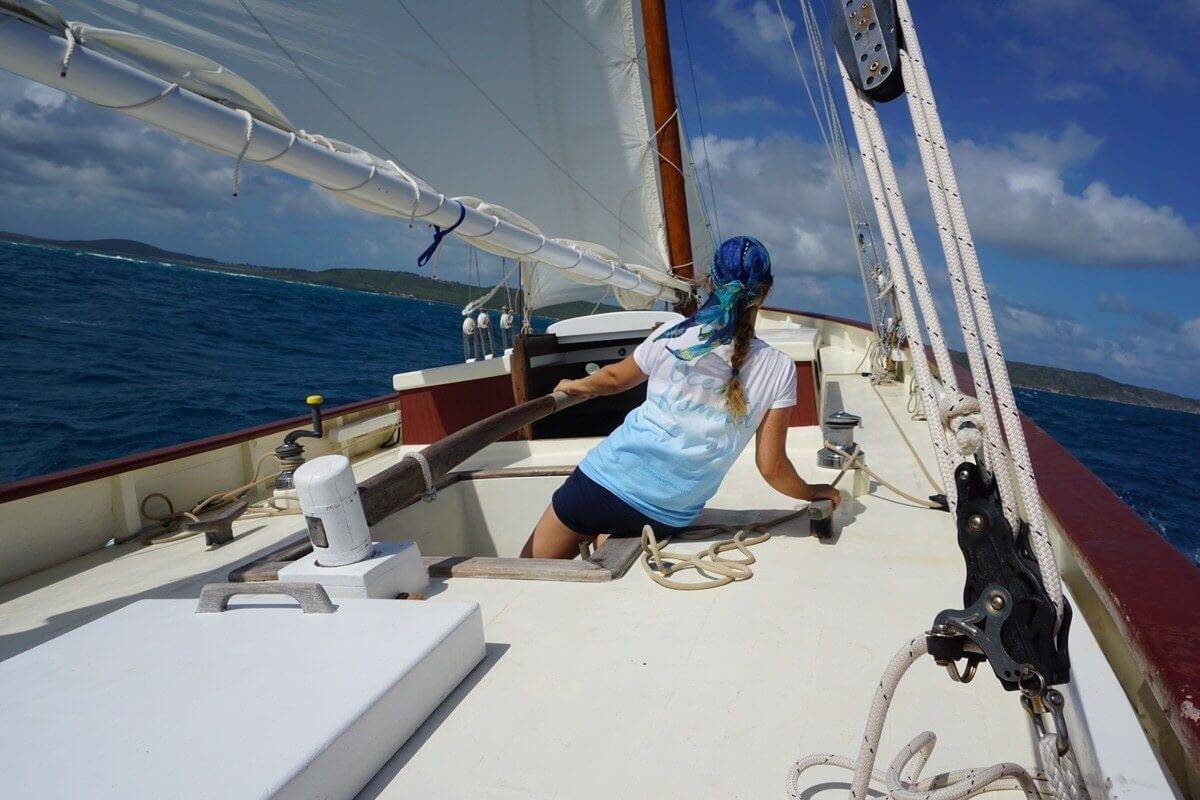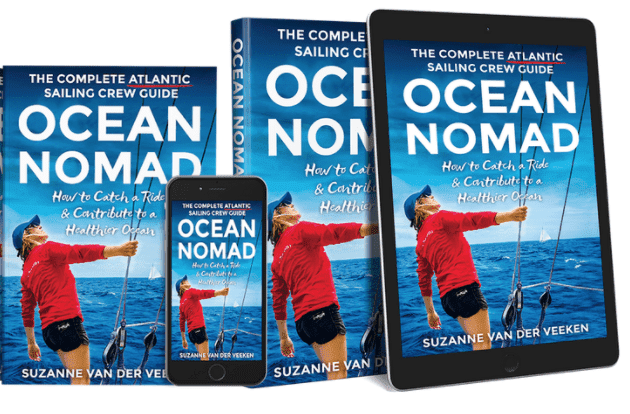What impact do you make?

The beach these days in the Gili Islands
“I get up every morning determined to both change the world and have one hell of a good time. Sometimes this makes planning my day difficult.” E.B. White
So what can you do?
Eco Travel Tips: Before take-off
Planning

Indonesia in ‘rainy’ season. Just 1 boat, green, and relaxed!
1. Plan for low season. You’ll be welcomed with open arms and receive all the attention of the locals. Help the local community to sustain their businesses all year round so they don’t have to turn to alternatives like selling mantarays, leaving their family to work elsewhere, or destructive fishing. It’s often the media that says ‘rainy/hurricane season, don’t go there’ while it’s actually the best time to go. The destinations are often as beautiful, if not more because of all the greenery. Last but not least, It’s way cheaper too.
2. Choose a green destination More and more destinations are making efforts to become more sustainable as a whole. Support these places. Check the GreenDestinations top100 for worlds greenest destinations, a new list being launched soon.
3. Read online brochures, blogs, e-books and apps for pre-trip excitement. Guidebooks and paper travel brochures are often huge. And how much do you really look in it? Save a tree. Keep it digital. You can use pocket to save your favourite travel articles and read them later offline on your phone or tablet. You can find a lot of (subjective) travel info on the Tripadvisor app and foursquare. Lonelyplanet has gone digital too.
4. Try to travel without a fuel burning machine. Go on a hiking, biking or (hitch)sailing trip. Or pitch your tent and don’t go anywhere. Avoid (huge) cruise ships, they are highly pollutive, distress marine life, and distress the peace in coastal and island communities with people invasions.
5. If you do go motorized, plan smart. Pick a place closer to home. If you do go far, make the trip last longer. If you do fly, take the shortest route with the least amount of stopovers (landings and take-offs are the worse for our planet). Fly during the day. Sun contrails emissions. Pick a newer aircraft that is considerably less harmful for the environment. Tools: flightconnections.com to find most direct connections. Rome2Rio to find different ways to go from A to B. Flightradar for aircrafts.
6. Don’t plan too much. Go with the flow, see what happens. Explore places beyond the guidebook or travel forum. You might end up at sleeping at a remote powerless village, that can often use more support than the already heavily visited tourist town, ranked 1 on tripadvisor.
Belaraghi Village in FloresAccommodation
7. Book directly with the accommodation provider. The local will notice a dollar more or less! The booking platforms won’t.
8. Book night 1, maybe 2, online but the rest locally. The most amazing accommodation experiences are found offline. Support those who are not internetsavvyy. If you like to stay where you book, extend locally. More money goes to the accommodation provider.
9. Book locally owned and/or staffed accommodation places. Your spendings from your travel go into the community, and not to a foreign rich dude to sponsor his next holiday house. Help the place to preserve it’s culture, pride and authenticity. Ask owners or book a homestay to find out if it’s local.
10. Book places and operators with an ecolabel. There are many certifications out there, like GreenKey and travellife. Labeled places are making an effort for sustainability. Support them and you support the planet. Find ecolabeled accommodation options on bookdifferent.
11. Choose smaller guesthouses, bungalows and homestays over the bigger ones. The big hotels often have a major power and water usage. Plus, the experience in smaller ones are usually more personal, fun and authentic.
12. Don’t go wild on airbnb. It’s often unfair competition to the legal local business owner who struggles to cover the license fees.
13. Volunteer and stay for free through HelpX, Wooffing, or WorkAway. You’ll learn, experience, contribute and spend very little money.
14. Adapt to the local air. Don’t book an airconditioned room. You really don’t need that. This costs loads of power and it’s unhealthy for you too. Adapt to the local air. Wondering why you get sick on holiday? Aircon could be why! It dries out your sinuses, making you more receptive for bacteria and viruses. Often coming from the aircon machine. It may take a few days, but it’s most healthy for you, and the environment, to just breathe the natural air. You’ll also hear the sounds of nature, instead of machine noise. If you think you really do need aircon, turn it off when you leave. You can turn your room into a freezer when you’re back.
Packing
15. Refill and re-use toiletry bottles instead of buying ‘travel friendly’ small toiletry packaging. These are not planet friendly. You use them a few times, then they are are finished, and you throw them ‘away.’
16. Remove all unnecessary packaging from your toiletries and things. It’s likely that waste processing is not as advanced abroad as in your home country. Unless you’re going to a developed country. Learn more about waste situation per country. How is your country doing?
17. Pack (Reusable) Spoon, fork, knife (or spork), straw, bag, refillable bottle and filtered bottle, and toothpicks! With this you can save hundreds of single use plastic items from ending up in nature. In the western world you may have to pay 10 cents now for a plastic bag. In the developing world you have to say 10 times no to not receive one. A straw is still a normal add-on in most of the world. It’s in the top 6 of trash found in sea. Also bring your own toothpicks. In many countries these are wrapped indivually in plastic. Very wasteful On ‘Reuseit‘ you can find all your reusables. Here’s more help to a life without plastic. Here’s a mega blog on how to pack with purpose. Learn what’s in my kit.

18. You don’t need or want bottled water. Ever. But you got to prepare for that. With my water-to-go filtered waterbottle I can scoop water from the dirtiest river and drink it. So can you. I got you a 10% discount with Water-to-go coupon code OPH2O. Water is a becoming a more and more scarce resource, plastic is becoming a nightmare. Bottled water that has been in the sun or heated is highly toxic too. LifeStraw is another solution that purifies water really well. They developed a stainless steel filter straw.

Where the bottles end up
19. Pack nature friendly sunscreen. Average sunscreen has tons of chemicals affecting corals and fish. Using biodegrable sunsreen is not only better for the environment, its much better for you too. Some tourism destinations even prohibit sunscreen to protect nature.
20. Are your toiletries planet friendly? All the fragrances, chemicals and things putting into our shampoo, shower gel, make-up, mosquito spray end up in our waterways and mess with your hormones. Check your product for polyethylene, polypropylene, terephthalate and methacrylate and save yourself and the ocean from some toxics. Or make your own!
21. Pack light. It saves the airplane and yourself loads of energy. What do we really need? If you end up packing heavy, and realize on the spot this is not convenient, like most girls do, give your clothes away. There’s people who can use it.

Do I really need to bring all this? No, I don’t.

A pencil can change the world
22. Check Pack for a purpose. Perhaps there is something they can really use at the place you’re going to? 23. Buy second hand. Check the online marketplaces (like Preloved) for a ‘new’ camera, travel bag, tent or toy you like to bring. Chances are high someone has just laying around what you’re looking for. 24. Have your travel documents digital. Don’t print. The only paper document you need these days is your passport. No need to print anything. Most airlines have an app for check-in and boarding. Save a tree and save a kilo of travel weight. If you really need a printed ticket, write to this business that’s it’s time to change this. Tool: tripit app. 25. All packed and set? turn off all the led lights in your home, turn down the heater, fridge, and close the water tap. Update: I wrote a full plastic-free travel gear guide on the packing department!
Pre-trip excitement
26. Learn the local language. Start learning a few words of the local language so you can maximize the experience once you’re there. Tools: Duolingo, Italki and worldnomad ipod guides. 27. Become a member of local facebook groups. These often give you interesting local insights, events, accommodation options, a trip with the local tour guide, or who knows a new friend. 28. Read online newspapers and destination information of the place you’re going too. Learn what’s happening and what’s being done. Check in advance how you can help in keeping the place green and clean so you can easily anticipate. Perhaps you can join a local initiative like a beach clean-up.
Kabam! 28 things tackled and you haven’t even left the building! You can be proud! Keep going.
Eco travel tips: On your trip
Touring & transport
29. Share taxi’s, boats and rides to minimize emissions per person, and most likely save a $ too. 30. Explore by bike, kayak, SUP board, longboard, hobiecat or foot. I promise you’ll get a deeper experience than by looking through the tourbus window.

Exploring Holland by kayak. Amazing what I see in my own country from a different perspective.
31. Take responsible tours with operators that support the local community and the environment. Do your research. Check websites, reviews, ecolabels, talk to them, talk to customers. The cheapest isn’t always the best option. I prefer smaller operators over big ones. Though a big one that lives up to its sustainability efforts is Gadventures. 32. Say no to 1 airplane dish or no to the tour take away lunch box and you save about 10 plastic wrappers. Airplanes but also many tour operators are the worst users of single plastic items. Did you know that your jetlag would be way less if you don’t eat until arrival? You’ll get straight into the local rhythm.

1 flight, 1 bag full of trash. A bit ridiculous, isn’t it?
Eating & drinking
33. Stay, don’t take-away. Have your coffee or lunch on the spot. Visit the typical local cafe or small restaurant, because there you will meet local people and their local pride and stories, and there local people will have better and more rewarding jobs. Avoid visiting international fast food and coffee chains. They diminish the authenticity of a place. Make a chat, connect and don’t take-away. You can save a plastic item. If you really got to take-away (on holiday?), bring your own cup, plate, banana leaf or coconut shell. If you don’t have that and there’s no other way than take-away, then don’t take the lid. Give it a shot explaining to the local WHY you don’t do take-away. Perhaps you can convince a soul to improve that situation.

Take

Away?
34. Make planet friendly food choices. We have an abundance of options. The veggies and fruit they have abroad – outside the city – are often of sublime quality due to the little distance travelled. The most impactful choice you can make for the planet and your own health is to cut out meat, fish and diary. Eating 1 meat dish has a bigger negative impact on the environment as your long haul flight (Cowspiracy)! 1 cow in 1 day produces as much GreenHouseGas as a car that drives 70.000 KM (Meatthetruth). What does that mean? It means that our spoon is probably the most powerful tool we can use to tackle climate change. We’ve all been told since kids that we need meat, fish, and dairy. I don’t believe this anymore. It’s exactly what we should not eat if we want to sustain our planet and our health. Sceptical? (Like I was) Learn more: Cowspiracy, Earthlings, Meat the truth, Comfortably unaware, EU Parlement, or just try like I’m doing. 

IF you eat fish, do it like this
35. Reconsider fish as a food choice. Our ocean doesn’t have the capacity to deal with our hungriness for fish. 90% of the big species (like tuna) has been scooped out already. 75% of all sealife is overexploited. The ocean ecosystem is on the verge of collapsing. When the ocean collapses, us humans go too. It sound like a distant happening. It’s not. Fish is not a sustainable food choice anymore. What about ‘sustainable’ farmed fish? Worse. It takes tonnes of wild fish to produce 1 ton of ‘eatable’, though little nutritiousness highly toxic, fish. After what I’ve seen, I don’t believe fish is healthy anymore to eat. Science backs it up. If you still do find fish a necessity, check what is the most responsible option to eat in the area. Try to find out HOW it is caught. There’s so many destructive fishing methods taking place, also by locals. Line caught fish without by-catch is least harmful. Choose fish with a high reproductive capacity and a low amount of fish needed for feeding before killing. Try to find out WHO is catching it. Fishing slavery is happening a lot. Here’s a great TedTalk on that one. I’m more dedicated than ever to this subject because the timeline is getting critically short. 36. Avoid restaurants serving endangered species. Or better, talk to the owner and explain why you’re not eating there. Write a review so others become aware. Shark and whale are still common on the menu.

Exciting local fruits. An adventure for the tastebuds!
37. Eat local dishes & fruits. This is most fresh, authentic and fun. It enhances the identity of a place, can be great discoveries and avoids places like Starbucks from entering the zone. 38. Ask where your coconut comes from. Did you know that 90+ % of the coconuts in Thailand are harvested by monkeys, thrown into monkey school as a baby, and are forced to pick up to 1000 coconuts per day? Where there is demand there is supply. Try to find to to guy that get’s them straight out of the coconut tree for you. It cannot get fresher!

The best and biggest coconut I’ve ever had! Straight from the tree. #nostraw
39. Wherever you go, bring your re-usable ones. Using my filter bottle has saved me 100 of plastic bottles to the trash pile, last month only! Using my bamboo and glass straws has saved 100s of plastic ones. Make it habit.

Coconut ‘o clock with reusable straw
40. Proactively say NO. With your order, mention ‘No straw.’ Look it up in the local language. With your tour or massage, say no to the plastic water cup. With your shopping, say no to the bag. Outsourcing your clothes for washing? Give a linen bag with it and ask to return it in the bag, not in a plastic wrapper. Say no to paper too. You don’t need a receipt for every thing you buy. These single use items have an average life span of 15 minutes and then are thrown ‘away.’ Only there is no such thing as ‘away.’ Where’s away? Eventually the ocean. Example: 3 weeks in asia = 42 waterbottles, 60 straws, 20 plastic bags, 10 spoons = 132 plastic items SAVED. I know, it’s a lot of NO’s. If we reduce the demand, we reduce the supply.
Experience
43. Only watch, don’t touch or chase wildlife. Don’t touch manta-rays, hug with koala’s, shake hands with sea turtles, or pick up seastars for the sake of a selfie. Stay minimum 1-meter distance away. They get stressed and can get sick. No one is picking you up either while your sleep, right?

Watch from a distance and admire their beauty

A popular thing to do in Asia

Kitesurfing in Tarifa
Environment

Bali shoreline. Did you know that plastic never ever disappears?
49. Ask the accommodation to NOT have your room cleaned every day. This is not necessary, especially not for bed sheets and towels. Washing machines take so much power and heavy chemical washing powder and cleaning stuff is often used. This all drains into our waterways.

#take3forthesea

These are the worst
People

With Spanish Mateo at the Feria. Time of my life!
53. Connect with the locals. You’ll meet them at your homestay, at the market, street, bar or beach. If not, find them through couchsurfing forums, facebook groups, or on local tour platforms. Learn what drives them and how they see the world. You get way more out of your trip, out of your life!
54. Help a local. You are a guest in their place. Think about what you can do to make it better for them? I just stopped writing this blog to help the bungalow manager to promote his place. It’s low season and no one can find his accommodation. He’s worried about his staff that have families to support. Together we go on tripadvisor, facebook and set up an Instagram account. I got a free lime juice, made a new friend, and his gratefulness made my day.
55. Be the example. With your small positive actions, you will surely inspire your travel buddy, hotel owner, tour guide or local friend.
56. Never ever give something to a begging kid. It encourages them to stay out of school. No candy either. They probably don’t have a dentist. If it’s really bad they might even be part of organized begging (that sometimes chop off a limb to trigger more donations!). Try to make the kid smile, with a joke, a drawing or a funny face. A smile goes a long way.
57. Contribute to the database of responsible travel content. Tell others about that amazing local restaurant or place you stayed on apps like foursquare and tripadvisor. Use local hastags and location features on Instagram, twitter or facebook so others can find your content. I have found amazing places through this and people have found places through mine. This doesn’t need a following. Do keep a few secrets though ;).

Playtime!
58. Don’t be online too much though. Disconnect from media and connect as much to nature as possible! It’s where we come from, it’s what energizes, it’s what make us keep going, it’s what we’re doing it all for!
Eco Travel tips: After your trip
59. Calculate your carbon impact, and act. Offset your travel. Adopt a coral here or here, plant a tree or support an organization offsetting carbon. Here’s another footprint calculator or take the ecological footprint quiz to learn more about what impact you’re actually maken.
60.Tell your friends about this nice local home-stay, the cool re-usable water bottle, the greatness of no aircon, and that awesome local dish to must try. Use your social media power to encourage for action and inspire your friends to make good choices. Use hashtags so more people can find you. You’ll surely inspire someone. Or take it bigger and start a website!
61. Green your diet. It’s the most impactful action you can take for the planet. Our planet simply does not have the capacity to feed all of us, like we consume now. With so many food options available these days, it’s not that hard to cut out meat, fish or dairy. Learn more here, here, here or here.
62. Write positive and negative reviews to highlight good practices and discourage bad ones. Google, tripadvisor, facebookpage reviews have biggest impact.
63. Give feedback to hotels, tour operators, travel agencies about your good and bad experiences. Help them improve.
64. Be a local host for the traveller visiting your town. Host a traveller on couchsurfing, especially those who after years of saving have been able to go abroad. If you cannot host someone at your home, show them around your town, let them experience your culture.
65. Never stop learning. Learn about places, cultures, environmental en social challenges. Take free courses on sustainability, star gazing, food and oceans. Watch TEDX, Listen to podcasts, read books, watch documentaries. Here’s a few mind (free) sustainability documentaries: meatthetruth, Planet Ocean, the 11th hour. Other must watches: Racing Extinction, Cowspiracy: the sustainability secret, A plastic planet.
66. Go local in your own area too. Buy foods and goods from your zone.
69. Think and act what you can do with your skills and resources to make this world a better place. If you can read, write, talk and travel, you are blessed with capacity to do great things for the people and the planet, not just profit.
70. Try all the above at home too!

What we’re doing it all for
The very last, Be grateful. Whether you’re travelling or are back home. Sometimes it gets a bit depressing by seeing, learning and experiencing the exploitation of people and our planet. Don’t let this spoil your life now. We can do good AND have fun at the same time. Enjoy every moment of being out there, connect with nature and realize how amazingly blessed you are with what you have. This keeps you energized to keep going. We only have one life. Make it a good one! Not just for yourself. For everyone and every living being still to come on this planet.
“Sow a thought, and you reap an act;
Sow an act, and you reap a habit;
Sow a habit, and you reap a character;
Sow a character, and you reap a destiny.”
― Samuel Smiles




























Wow Suz! You are truly amazing. You list seems endless and I loved every suggestion you made.
I have a remark about the cotton. Most cotton is harvest in bad labor surcomstances, using lots of water and painted in chemicals. Make sure you buy sustainable organic cotton if you do.
Hemp, bamboo and eucalyptus are great incredible soft fibers and less water is used to produce your clothing.
I am very very curious about the water bottle with filter! In the Netherlands we are blessed with clean water and I always use my camelbak waterbottle and bamboo reusable zozial coffeecup.
By supporting Suz her project on indigogo you can get the filter bottle too.
Keep on going you are truly an inspiration <3
Hey Lonneke! Thank you so much! You are doing great things. And fantastic input on the cotton! I will adapt this in the list to make sure positive action is taken. Keep going :)
What an absolutely awesome – and awesomely thorough – list! Thanks for all the work which went into it.
Thank you Daniel! Glad you like it:)
Great list Suzanne, thank you so much for the input.
This is fantastic! Thanks so much. As a full time travel family we are really trying to be more eco in our approach and started with plastic free